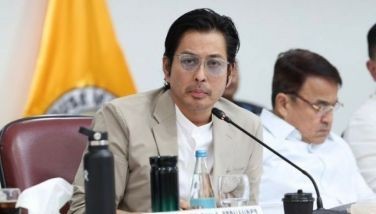Olympics a lesson in history, culture
August 15, 2004 | 12:00am
The Olympic Games, planet Earth’s greatest sports spectacle, not only is an extravaganza showing humankind’s "cream of the crop" young athletes in action.
It also gives lessons in history, geography, and culture.
At best, the Games tells the world how the Family of Nations has grown.
Throughout the millennia, notably since the Olympic Games began in Greece about 3,000 years ago, the world has expanded, shrunk, expanded and shrunk.
The Greek and Roman empires exemplified the expansion of territories under an expansionist state.
As a footnote, the Olympic Games played by the Greeks starting in 776 BC headed for temporary oblivion when Greece lost its independence to Rome in the middle of the second century BC.
Participants in the Games initially came from Greek metropolises, notably Athens (today capital of the country) and Sparta, and later from other cities in the Greek empire.
The Roman Emperor Theodosius I finally abolished the Games in AD 394.
But the sports competitions were revived 15 centuries later through the efforts of a Frenchman, Baron Pierre de Coubertin.
The number of country-participants in the Olympics continues to grow.
In the ongoing 28th Olympiad, 202 countries are participating.
Once upon a recent time, some of these countries were one. Others were split owing to political conflicts. Others were two but were later reunited. Some are still trying to become one again.
For instance, it was not long ago when the Union of Soviet Socialist Republics (USSR) was a formidable monolith of 15 republics. It has since disintegrated with the collapse of communism/socialism, particularly in Russia.
In the opening parade of delegations of participating nations in the Olympiad yesterday, the Russian Federation and some former members of the USSR (Turkmenistan, Tajikistan, Kyrgystan) were on their own. Their athletes are likely to face each other during the Aug. 13-29 sports competitions.
Czechoslovakia once was one, too. What the world saw in the opening ceremonies of the 28th Games in Athens were the separate delegations of Czech Republic and Slovakia.
Further into the past, Pakistan and Bangladesh were once West and East Pakistan, respectively. They were split about three decades ago following a bloody secessionist war.
Times, indeed, have changed in kaleidoscopic rapidity.
Before World War I, Germany was one vast country. It was divided into West and East Germany after the holocaust but eventually the two Germanys were reunited more than a decade ago. The Berlin Wall that divided East and West Germany is no more and, since the reunification, Germany has become a more formidable sports power.
South Vietnam and North Vietnam have also been reunited.
The world’s most populous country, People’s Republic of China, and Chinese Taipei remain separate in the Games, although PROC considers Taiwan as its province.
Encouragingly, no political overtones are ruffling the 28th Olympiad from the Chinese’s end. In the Montreal Games, though, the Canadian government denied visas to the Taiwanese athletes because they refused to forego the title of Republic of China, under which the National Olympic Committee was admitted to the International Olympic Committee.
But one inspiring scenario during the opening of the 28th Games was the joint delegations of South and North Korea. The flagbearers and delegations of the two split countries marched in tandem, with the flagbearers (a man and a woman) bearing a banner of white and blue.
Hopes have never been given up that one day, these two East Asian countries which have been at loggerheads since the Korean War in the early 1950s will be reunited.
As in the past Olympic Games, the "big" and "small" will again mix it up in the Olympiad.
For instance, China now has a population of 1.3 billion, which constitutes about a fifth of the world’s. India has about one billion. On the other hand, other countries are sparsely populated: Cook Island (21,000), Cayman islands (41,000), Dominica (70,000), and Kiribati (100,000).
To many, including Filipinos, who were busy doing things while the world heaved in recent times, they were fascinated to learn countries with strange sounding names.
Examples, as gleaned from the procession of country delegations: Saint Lucia, Saint Vincent and the Grenadines, Saint Kitts and Nevis, Sao Tome and Principe, Antiga and Barbuda, Andorra, Comoros, Liechtenstein, Burkina Faso, Serbia and Montenegro, Djibouti, and Timor-Leste.
Also, don’t get mixed up with the following countries: Guinea, Papua New Guinea, Equatorial Guinea, and Guinea-Bissau.
Once upon a time, too, countries bore names different from what they have today.
Myanmar was once Burma. Sri Lanka used to be called Ceylon. East Pakistan is now Bangladesh.
The Olympic Games also give lessons in geography.
Where in the world, for instance, is Comoros? It is in Africa. And Seychelles? It is an island state bobbing in the Indian Ocean. And Djibouti, and Sao Tome and Principe? In the northeast and west coasts of Africa, respectively. Luxembourg? In Central Europe.
Spectators (actual and television) of the 28th Olympic Games opening ceremonies, for all their pomp and pageantry, were also treated to lessons on the national costumes of many of the participating countries and the colors and designs of the nations’ flags.
And so the Games opened and was off to a grand opening rites. The athletes, to paraphrase the legendary Julius Caesar, came, will see, and dream and fervently hope to conquer.
But sports is not all that preoccupies the world world within the next two weeks of the global sporting spectacle. The Olympic Games offer shades of history, geography, culture, and more.
It also gives lessons in history, geography, and culture.
At best, the Games tells the world how the Family of Nations has grown.
Throughout the millennia, notably since the Olympic Games began in Greece about 3,000 years ago, the world has expanded, shrunk, expanded and shrunk.
The Greek and Roman empires exemplified the expansion of territories under an expansionist state.
As a footnote, the Olympic Games played by the Greeks starting in 776 BC headed for temporary oblivion when Greece lost its independence to Rome in the middle of the second century BC.
Participants in the Games initially came from Greek metropolises, notably Athens (today capital of the country) and Sparta, and later from other cities in the Greek empire.
The Roman Emperor Theodosius I finally abolished the Games in AD 394.
But the sports competitions were revived 15 centuries later through the efforts of a Frenchman, Baron Pierre de Coubertin.
The number of country-participants in the Olympics continues to grow.
In the ongoing 28th Olympiad, 202 countries are participating.
Once upon a recent time, some of these countries were one. Others were split owing to political conflicts. Others were two but were later reunited. Some are still trying to become one again.
For instance, it was not long ago when the Union of Soviet Socialist Republics (USSR) was a formidable monolith of 15 republics. It has since disintegrated with the collapse of communism/socialism, particularly in Russia.
In the opening parade of delegations of participating nations in the Olympiad yesterday, the Russian Federation and some former members of the USSR (Turkmenistan, Tajikistan, Kyrgystan) were on their own. Their athletes are likely to face each other during the Aug. 13-29 sports competitions.
Czechoslovakia once was one, too. What the world saw in the opening ceremonies of the 28th Games in Athens were the separate delegations of Czech Republic and Slovakia.
Further into the past, Pakistan and Bangladesh were once West and East Pakistan, respectively. They were split about three decades ago following a bloody secessionist war.
Times, indeed, have changed in kaleidoscopic rapidity.
Before World War I, Germany was one vast country. It was divided into West and East Germany after the holocaust but eventually the two Germanys were reunited more than a decade ago. The Berlin Wall that divided East and West Germany is no more and, since the reunification, Germany has become a more formidable sports power.
South Vietnam and North Vietnam have also been reunited.
The world’s most populous country, People’s Republic of China, and Chinese Taipei remain separate in the Games, although PROC considers Taiwan as its province.
Encouragingly, no political overtones are ruffling the 28th Olympiad from the Chinese’s end. In the Montreal Games, though, the Canadian government denied visas to the Taiwanese athletes because they refused to forego the title of Republic of China, under which the National Olympic Committee was admitted to the International Olympic Committee.
But one inspiring scenario during the opening of the 28th Games was the joint delegations of South and North Korea. The flagbearers and delegations of the two split countries marched in tandem, with the flagbearers (a man and a woman) bearing a banner of white and blue.
Hopes have never been given up that one day, these two East Asian countries which have been at loggerheads since the Korean War in the early 1950s will be reunited.
As in the past Olympic Games, the "big" and "small" will again mix it up in the Olympiad.
For instance, China now has a population of 1.3 billion, which constitutes about a fifth of the world’s. India has about one billion. On the other hand, other countries are sparsely populated: Cook Island (21,000), Cayman islands (41,000), Dominica (70,000), and Kiribati (100,000).
To many, including Filipinos, who were busy doing things while the world heaved in recent times, they were fascinated to learn countries with strange sounding names.
Examples, as gleaned from the procession of country delegations: Saint Lucia, Saint Vincent and the Grenadines, Saint Kitts and Nevis, Sao Tome and Principe, Antiga and Barbuda, Andorra, Comoros, Liechtenstein, Burkina Faso, Serbia and Montenegro, Djibouti, and Timor-Leste.
Also, don’t get mixed up with the following countries: Guinea, Papua New Guinea, Equatorial Guinea, and Guinea-Bissau.
Once upon a time, too, countries bore names different from what they have today.
Myanmar was once Burma. Sri Lanka used to be called Ceylon. East Pakistan is now Bangladesh.
The Olympic Games also give lessons in geography.
Where in the world, for instance, is Comoros? It is in Africa. And Seychelles? It is an island state bobbing in the Indian Ocean. And Djibouti, and Sao Tome and Principe? In the northeast and west coasts of Africa, respectively. Luxembourg? In Central Europe.
Spectators (actual and television) of the 28th Olympic Games opening ceremonies, for all their pomp and pageantry, were also treated to lessons on the national costumes of many of the participating countries and the colors and designs of the nations’ flags.
And so the Games opened and was off to a grand opening rites. The athletes, to paraphrase the legendary Julius Caesar, came, will see, and dream and fervently hope to conquer.
But sports is not all that preoccupies the world world within the next two weeks of the global sporting spectacle. The Olympic Games offer shades of history, geography, culture, and more.
BrandSpace Articles
<
>
- Latest
- Trending
Trending
Latest
Trending
Latest
Recommended































